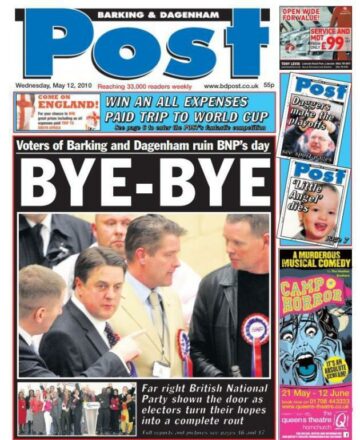
Ten years ago today, the BNP and their vile leader Nick Griffin became nothing more than a footnote in British political history. May 7th 2010 delivered a devastating result nationally for the Labour Party. Yet in Barking and Dagenham we still had a reason to celebrate.
Back in 2006, the BNP had elected 12 councillors to Barking and Dagenham Town Hall, having only stood 13 candidates. Had they stood candidates in all the seats that were being contested, we would have had the first BNP-controlled council in the country.
Back then the threat was very real as the BNP poured all their resources into taking over the Town Hall and gaining their first parliamentary seat. Voters were angry with Labour – especially on the issue of immigration – the Tories were still in the wilderness and people’s hostility towards the political establishment was cleverly exploited by the extreme right. We had a real fight on our hands.

Fast forward four years and the BNP were resoundingly smashed. Nick Griffin came a distant third place, and I was re-elected with a majority of more than 16,000. In the local elections held on the same day, every single BNP councillor lost their seat as each ward returned a full slate of Labour councillors.
As we start to rebuild trust in Labour under the new leadership of Keir Starmer, what did we learn from our Battle for Barking in 2010 that remains relevant in 2020? Some of what we did then has become commonplace in many constituencies today. But as we start to climb the electoral mountain we have to conquer, it is crucial to work with a clear and sustained approach to campaigning in every constituency where we want to win.
Here are the top lessons I took from the Battle for Barking.
- Gaining people’s trust is a marathon, not a sprint. It took us four years of intelligent and regular campaigning to rebuild support for Labour. There is little point flooding a constituency with activists four weeks before an election if you have not done the groundwork beforehand. In Barking and Dagenham, supported by hundreds of brilliant activists, we had countless ‘days of action’ years before the election itself. By 2010, we knew the voting intention of over 80% of the constituency. Few campaigners could say the same at the 2019 general election.
- All politics starts from the local. As activists, we may be tempted to start the conversation with voters talking about national issues, like austerity or Europe. But for most people, their politics starts from concerns about what is happening in their immediate environment, on their street or in their local area. They may be riled about rubbish on the streets or the location of a bus stop. Of course, some of their local concerns may be connected to issues of national importance like immigration, the lack of affordable housing or benefit cuts. What is vital is to listen to people’s concerns rather than preach about our priorities. If you listen and then act on the local issues (sort out the rubbish or get the bus stop moved), and then communicate and tell voters what you have done, you can start to rebuild trust.
- Stop looking inwards, and focus outwards. The Labour Party was not built to be a debating society. Its purpose is to win elections. In the last four years too much time has been spent on everything from reselections to emergency motions. We focused on the membership and not connecting with the public. The same was true of Barking and Dagenham in 2006. We squabbled and our mainly male, white and ageing membership did not connect with the local community. So we grew and transformed our local party into one that reflected the changing borough, with a diverse team of activists and local candidates. We also turned outwards with a relentless focus on popular local campaigns, doorstep canvassing, street meetings and coffee afternoons rather than internal party wrangling.
- Be honest with voters. In 2010 we knew that it was pointless to get into an argument with the BNP about the level of immigration. It might have seemed easy politics to promise we would cut migration numbers but that would have been wrong on two grounds. First, as the Tories have learnt, you will never deliver on a commitment to cut immigration numbers and a failed promise only further fuels distrust. Second, Labour’s lasting values centre on our internationalist and anti-racist principles and we should always work to uphold those. Instead we were honest that immigration was a part of modern life and talked about how we could make this work in an area that was struggling with the speed of change. We focussed not on immigration but on integration, and the trust that we had built by listening and responding to local concerns gave us the capacity and space to engage in these difficult conversations.
- Expose your opponents for what they are and play to your strengths. Every constituency is different and the political challenges and advantages will vary. In Barking in 2010, many traditional supporters were frustrated with Labour, but we ruthlessly exposed the BNP so that most refused to hold their nose and vote for them. Holocaust denial, Nazi sympathies and forced deportations were the nasty reality of the BNP. There were those who argued that the extreme right should not be given the oxygen of publicity. But we found that telling the truth about the BNP helped to bring about their demise.
Every constituency is different, and the ‘Barking Model’ that defeated the BNP was developed when digital campaigning was still in its infancy. Yet much of what we achieved can still be adapted to fight and win future elections. Whether rebuilding support in Scotland, reconnecting with voters in the ‘Red Wall’ or winning back seats across the South East for the first time in more than a decade, candidates, local parties and Labour HQ can use these lessons so we are election-ready once again.




More from LabourList
Letters to the Editor – week ending 15th February 2026
‘Labour council candidates – it’s tough, but all is not lost’
‘Labour won’t stop the far right by changing leaders — only by proving what the left can deliver’